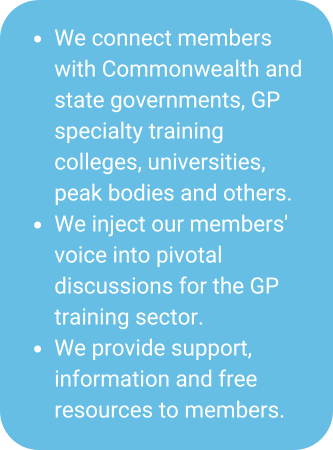SLOs
Joint meeting of the SLO and RLO Advisory Councils, June 2024
The timing of the second annual face to face meeting of the SLO Advisory Council, in June 2024 in Brisbane, provided the opportunity for an historic joint meeting with the RLO Advisory Council.
Just minutes after this meeting got underway, it became apparent that the similarities in attitudes and goals far outweighed any differences between these supposedly opposing cohorts. The room was highly energised with resounding cries of “this has to be an annual event!”
Echoing the subjects of the advice presented to the Colleges the previous afternoon, together the SLOs and RLOs settled on four areas for joint advocacy:
1. Practice accreditation - specifically the de-accreditation of practices not meeting requirements
- Discussion included feedback on registrar practice choices prioritising location over educational value. RLOs have received minimal feedback on this issue beyond informal discussions.
- Registrars fear reprisal and prefer to provide verbal over formal feedback, hindering their ability to raise concerns about bullying or other issues.
- Establishing a supportive environment like a safehouse could alleviate these concerns.
- Formal feedback mechanisms could help avoid problematic supervisors or practices, akin to grading systems used in hospitals.
- Effective feedback mechanisms should be proactive, allowing supervisors to request and act on feedback early.
- Policies must empower registrars to report issues without hindrance, ensuring support and facilitating relocation from problematic practices.
- Strengthening conflict resolution in NTCER could include breach notifications and penalties affecting accreditation, promoting early intervention and resolution training for all involved.
2. Barriers to open communication between SLOs and RLOs preventing effective issue resolution
- Both groups identified barriers in performing their roles effectively, many feeling they cannot speak up independently due to their ties to the Colleges. This affects their sense of psychological safety.
- Since the shift from RTOs to College-led training, there have been significant changes in culture and operations, and issues such as outdated lists and slow communication have become the norm.
- Clearer lines of communication and unrestricted membership communications across SLO/RLO cohorts and across all regions was suggested. Overall, the question was whether improving broader principles in the training programs could address many concerns about how SLO/RLO operations are managed under College employment and oversight.
Recommendation 3 – For communication to be independently managed outside of College employment in order for tactical changes to follow.
3. 12-month placements and flexibility to choose
- Discussions showed that registrars want the flexibility to choose between shorter or full-year placements. They face challenges if issues arise soon after starting due to the chronic delays in accessing a new MPN even if they can find an alternate placement
- Structural (MPN) changes are essential for safety to be the priority so registrars can quickly move out of potentially unsafe practices without a bad situation being worsened through financial impact.
- Providing an opt-out for the 12-month commitment and addressing issues promptly would be beneficial.
- Both groups value minimising paperwork and ensuring continuity of patient care, alongside practical considerations like streamlined entry into the TMS and housing/rental flexibility.
4. Diversity of practice policy
- RLOs expressed a preference to have the choice of staying at their current practice or transitioning to a different one to meet diversity requirements. They propose that diversity requirements could be satisfied by working two days per week or 2-week blocks in various practices, rather than committing to a single practice for six months at a time.
- With a growing concern that the authority to decide on these diversity practices may soon shift away from the Colleges through the WPP program, SLOs and RLOs thought this imperative to address before new government policies are established.
- Building long-term patient relationships is crucial for quality care, which isn’t emphasised in the current diversity rules. Longer placements often benefit both registrars and practices more than short-term diversity arrangements.
Other areas of discussion included bringing PMLOs to future joint meetings, and concerns about registrars needing to pay for external courses / material (GP Academy) due to exam pressures, which in turn creates tension for supervisors trying to maximise the learning opportunity of the registrar’s time in the practice.
Join GPSA's free Community platform to connect with your SLO and other supervision team members in your jurisdiction.
Date reviewed: 01 July 2025

